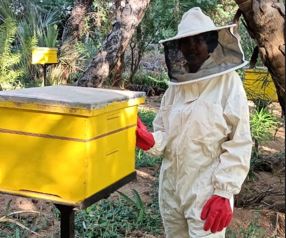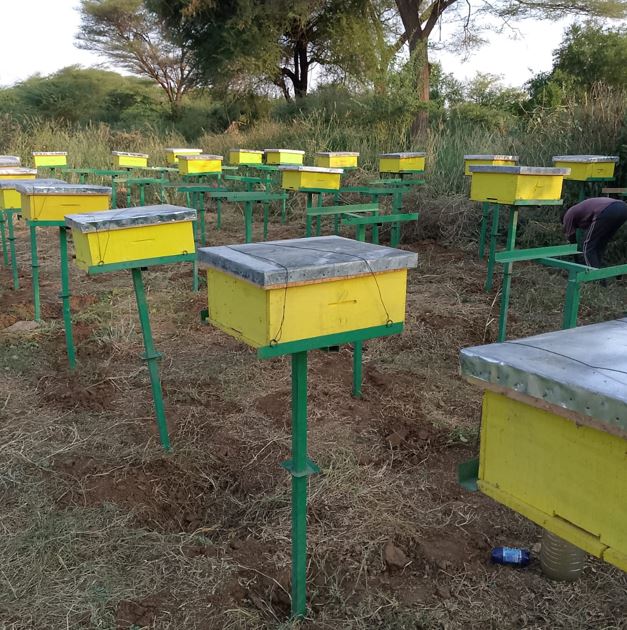Garissa pastoralists venture into beekeeping after floods destroy crops

Ebla learnt the art of resilience from her mother who embraced crop farming after losing her livestock to cycles of drought.
Facing unrelenting challenges of recurring drought and floods occasioned by climate change, pastoralist communities who ventured into crop farming are embracing beekeeping as an alternative source of livelihood.
Recent flash floods wreaked havoc and resulted in heavy losses of farm produce, prompting many to diversify by adopting beekeeping alongside small-scale farming in Garissa County.
More To Read
- Salty-sweet flavoured mangrove honey: The pride of Kenya’s Coast
- Garissa farmers turn to beekeeping as a climate-resilient livelihood
- From logging to honey production: How beekeeping is saving Lamu’s mangroves forests
- Kilifi beekeepers stare at job losses as prolonged drought bites
- Isiolo women profit from the lucrative honey products business
- Beekeeping fast becoming profitable venture for pastoralist women
Ebla Hassan of Ebby farm in Korakora, Garissa Township sub-county is among many farmers who found beekeeping as an alternative source of livelihood after their crops were destroyed by the April- May rains that resulted in disastrous floods.
“Before the recent floods, the December 2023 El Niño rains destroyed my crops. I bought 200 modern beehives and traditional beehives for beekeeping at my farm along the River Tana and the outcome was very impressive and promising,” she said.
However, the heavy floods caused by the April-May rainfall left a trail of destruction and over 170 beehives were carried away.
But the loss would not discourage Ebla from going on with her beekeeping venture.
She said that like other farms along the River Tana, she has adopted mitigation to ensure the beehives withstand any future calamities like heavy floods.
Ebla says she learnt the art of being resilient from her mother who embraced crop farming after she lost her livestock to cycles of drought.
Based on the experience she got from her parents, the mother of five children appreciates that climate change also poses major challenges to crop farming
“These unrelenting challenges forced me to seek another alternative source of income and my current experience with beekeeping is admirable,” she said.
Ebla who recently received training from the National Beekeeping Institute, Lenana, is contemplating switching completely to beekeeping instead of investing in crop farming.
In an interview with The Eastleigh Voice, Ebla said she plans to have about 10,000 beehives.
She said that beekeeping is cost-effective and helps in the restoration of the ecosystem. She added that the high demand for honey within Garissa town is one of the factors that influenced her to venture into beekeeping.
 Bee hives at Filay honey group farm in Sankuri sub-county. (photo: Issa Hussein)
Bee hives at Filay honey group farm in Sankuri sub-county. (photo: Issa Hussein)
Ebla, who is the secretary-general of the Garissa Farmers Network which has over 7,000 members, said she is determined to influence many farmers in her region to practice beekeeping to reduce the losses they face from farming during floods.
“From crop pollination to conservation of the forest that will help to reduce the impact of the floods, I found beekeeping a promising alternative until a solution will come to control the massive floods that were regularly destroying our farms,” she said.
Abdi Farah, the chairman of the Garissa Farmers Network, disclosed he recently initiated a beekeeping group of nine members at Balij in Sankuri sub-county.
With more people embracing beekeeping, Abdi said they registered a group which now has 38 members who together have 700 bee hives which can produce 2,000 kilos of honey annually, with one kilo being sold at Sh1,000 at the Garissa town market.
He said they sought support and training from donors including the World Food Programme and the Somali Lifeline Organisation.
He said they are determined to produce more honey products including propolis, bee venom, royal jelly, wax and honeycomb that are highly sought after on the local and international markets.
“Bee venom is one of the products that can instantly change your life since one gram currently sells at about Sh30,000. We only need training on how to extract the product,” he said.
Each bee contains only a few milligrams of venom.
 Branded honey from Ebby farm ready for sale. (Photo: Issa Hussein)
Branded honey from Ebby farm ready for sale. (Photo: Issa Hussein)
Abdi said he is determined to influence local farmers to engage more in beekeeping as an alternative source of livelihood due to challenges posed by the floods.
He said during the recent floods, none of his members lost a single beehive since they have built stands and pellets to protect the hives against harsh weather conditions.
Abdiweli Salad said that after the floods that destroyed his bananas and fruit trees, he decided to venture into beekeeping and planting fodder crops as an alternative source of livelihood.
“I realised that it is the only option to help overcome the challenges posed by climate change,” he said.
He said he invested in up to 100 beehives but some were washed away by the floods while others survived, giving him the experience to build his resilience against the climatic shocks.
“Compared to the loss I incurred from the destroyed crops, I have made up my mind and my focus will now be on wholeheartedly practising beekeeping as an alternative source of livelihood,” he said.
He urged farmers in Garissa not to hesitate about starting beekeeping as the next promising source of income, saying it is more cost-effective compared to crop farming.
According to Abdiweli, the water from River Tana and the forest along the river was a big boost in achieving a successful beekeeping initiative.
Top Stories Today















































